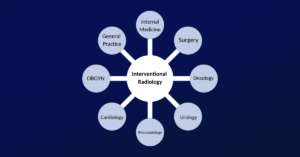Interventional radiology is an exciting and innovative field unlike any other. Not only because it allows us to treat a myriad of conditions non-surgically and with unparalleled precision but also because it is one of few specialties that consistently relies on a collaborative, multidisciplinary approach to healthcare.
The term “multidisciplinary” in this context defines a collaborative and comprehensive way to provide medical care that involves the partnership of healthcare professionals from all different fields.
The goal with this type of approach is to give patients the best possible care by taking into account all aspects of their health, recognizing that each patient’s needs should be the main focus of any treatment plan.
With this type of collaborative approach, there is no competition because everyone plays a unique and special role.
Interventional Radiology is Like a Potluck Dinner
To better visualize this concept, think of interventional radiology as if it were a potluck dinner. I know it sounds a little “out there,” but stick with me for a second…
Just as a potluck dinner brings together people with different culinary skills, dishes, and palettes, endovascular specialists bring together medical professionals with different areas of expertise.

When it comes to healthcare, we often think of different fields as though they operate separately. However, the best way to provide optimal patient care is for healthcare professionals from various disciplines to work together.
Picture it: Each member of a patient’s healthcare team contributing their own unique skills and knowledge to help design an awesome treatment plan for their patient. Now THAT is something to get excited about.
Referrals: The Future of Healthcare
One of the ways we most commonly see this type of collaborative thinking in action is with referrals. For instance, an OBGYN might choose to refer her patient to an endovascular specialist so that she can avoid a hysterectomy.
Would it benefit the doctor to avoid a referral and go forward with major surgery? Maybe.
Will a referral best serve the patient? Absolutely.
By working alongside your family doctor, we at ECCO Medical are able to provide specialized care that’s tailored to your specific concerns. This collaboration ensures that you get a more comprehensive and integrated approach to the care you need.
No more jumping from one specialist to another – referrals grant you access to a team of professionals who are all up-to-date on your condition and goals.

What Conditions Can Interventional Radiology Help Treat?
So what conditions can interventional radiology help treat? The list is endless and expanding every day, but here are a few of the most common conditions we treat here at ECCO Medical:
- Benign Prostatic Hyperplasia (Enlarged Prostate)
- Uterine Fibroids
- Knee Pain
- Liver Cancer
- Peripheral Artery Disease
- Venous Issues
There are, of course, more traditional treatment options available for many of these conditions, but none offer the level of convenience, patient comfort and precision that we do.
For a more comprehensive look at the conditions IR can treat, click here!
In Conclusion
In the end, the various objectives of our healthcare system should all boil down to one thing: providing the best patient care possible. And a collaborative, like-minded approach between healthcare providers is one of the most effective ways to make that happen.
At ECCO Medical, we make it easier than ever before for doctors and patients alike to access top-notch specialty medical services. What a great example of the creative solutions needed to move personal health into an age where anyone can get and maintain quality care!
The minimally-invasive endovascular techniques that interventional radiology offers serve a variety of benefits, such as shortened recovery times with less risk than traditional surgical procedures. So if you feel you could benefit from one of these innovative therapies, talk to your doctor!
For patients wanting to learn more about ECCO Medical’s services, please click here.
For doctors interested in referring a patient, please click here.




